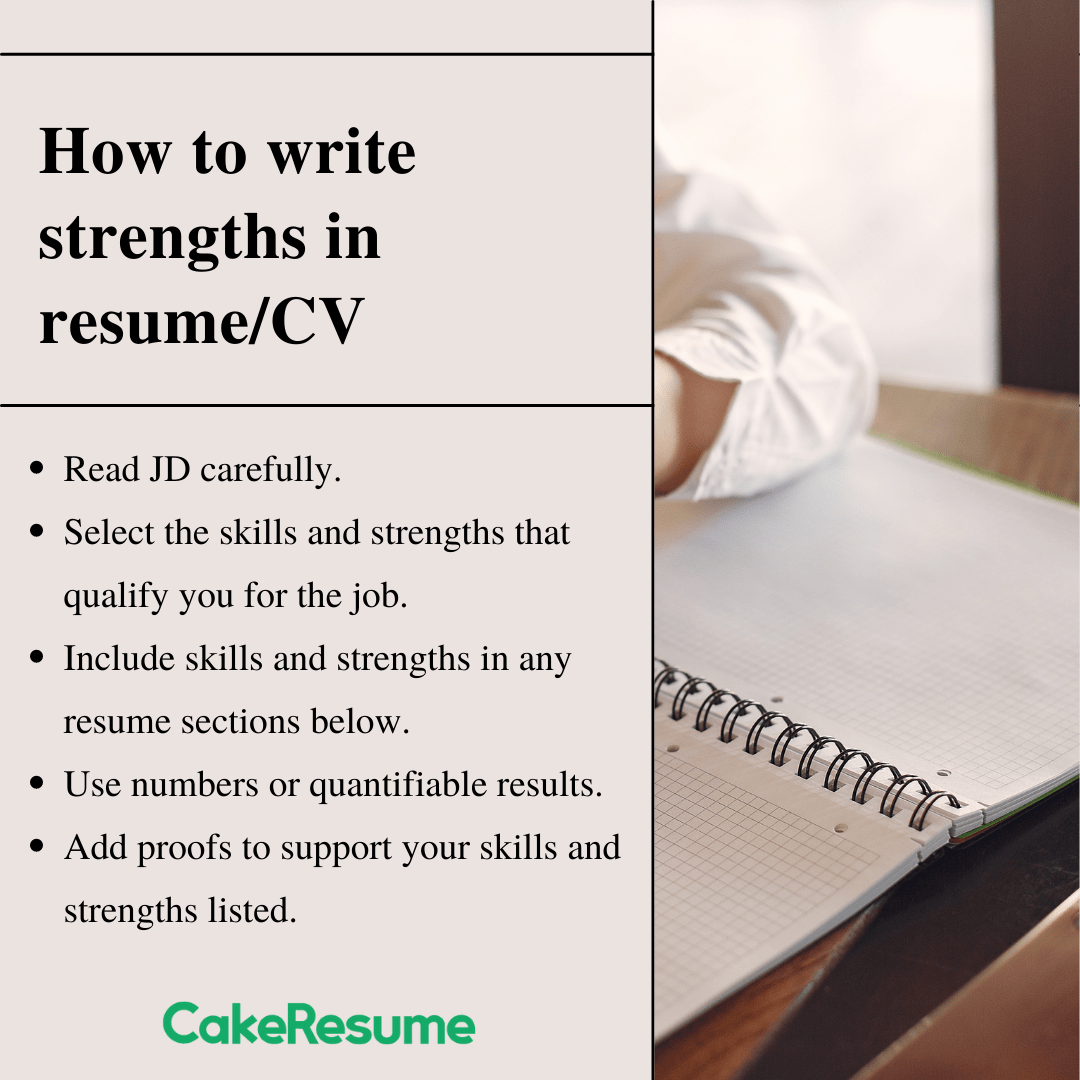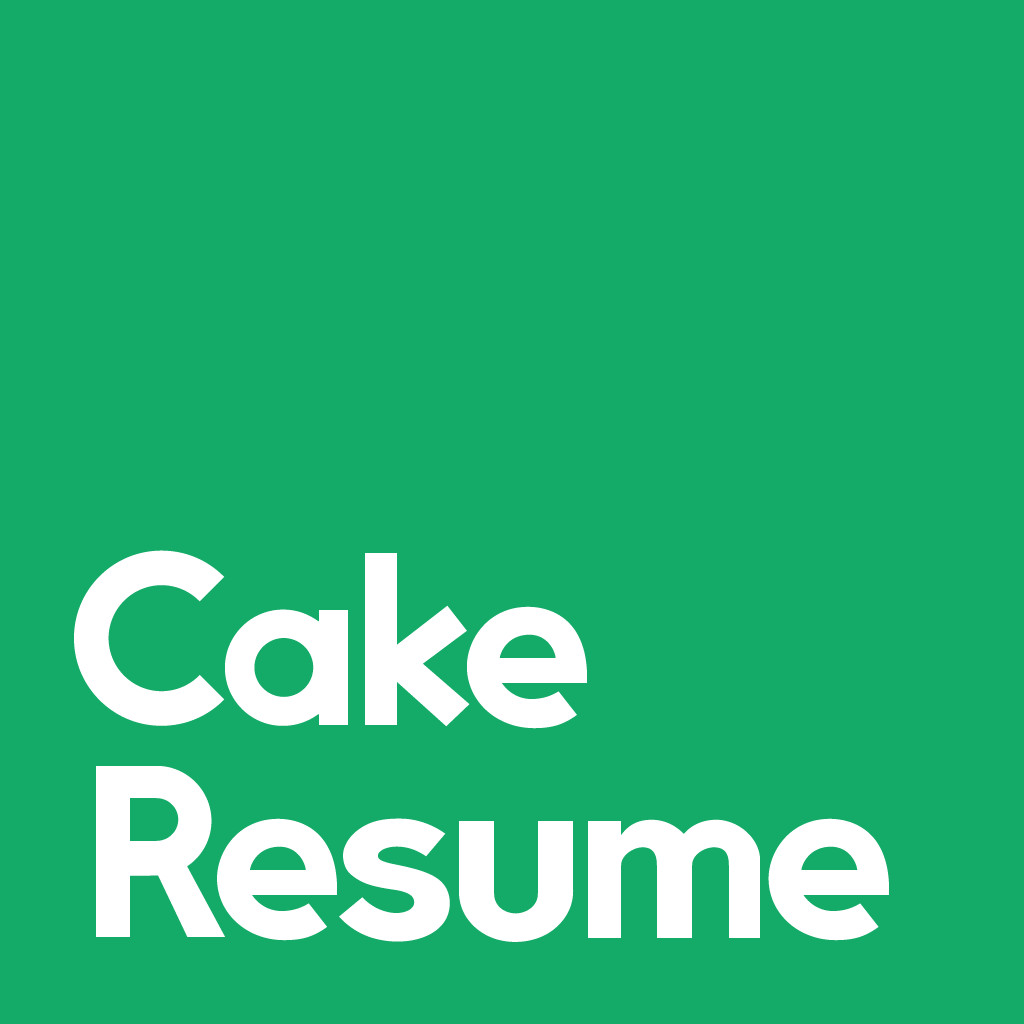100+ Resume Strength Examples to Level Up Your Job Hunt

Think of this scenario - you have been applying for jobs in the past month, but nothing moved forward. You wondered what happened and why you were not able to stand out among the crowd. Here might be the component you may have missed - including your strengths in your resume. Listing skills on your resume is one thing, but emphasizing your skills and strengths in a resume is another.
Three main areas where you can list your resume strength points:
Once you have explored your key resume strengths, you will need to find a way to integrate these strengths into your resume or cover letter. In this article, we will explore further the concept of resume strengths, steps in listing strengths in your resume, and demonstrate some resume strength examples.
Resume strengths refer to strengths an individual applicant possesses that sets them apart from other applicants. These strengths in a resume are typically traits and knowledge that benefit the job description and impress the hiring manager. It is important to highlight your skills and strengths in a resume. Including the strengths of a person in a resume can emphasize your previous work experience and competence in the field by including personal attributes in your resume.
Table of Contents:
What are Resume Strengths?
Resume strengths are personal skills, traits, or talents that help you thrive in your job. They are usually skills that allow you to go above and beyond. Sometimes, they can even be exceptional skills that you aren’t aware of since they are a part of who you are. Keep in mind that your values are inherently connected to your resume strengths while identifying them.
What sets apart personal vs. professional strengths?
Both personal and professional strengths can be good strengths for your resume. However, what is the difference between personal and professional strengths?
- Personal strengths: are qualities that you are aware of, and they serve you meaning and satisfaction. Some examples of personal strengths in a resume include being team-oriented, self-controlled, and prudent.
- Professional strengths: are hard and soft skills that you possess. These qualities bring values to a workplace. For example, an ability to work well with others helps you achieve goals for the company. Other examples of professional strength to write in a resume include budgeting, coordination, and data analysis.
No matter whether you are seeking to add your personal or professional strengths to add to your resume, the key to succeeding in a strong resume is to know how to identify your strengths. If you are unsure of what you’re capable of, start by discovering what you enjoy as a hobby and what you do during your free time. Furthermore, personal and professional strengths can be discovered from your past work experience.
How do strengths differ between resumes?
Once you have uncovered your core strengths to put in a resume, you will need to adjust them based on different company’s needs. An advantage of adjusting your core strength based on different job descriptions is that companies will feel that the strengths in your resume show that you are a good fit for the role.
How to Write Skills and Strengths in a Resume/CV
Step 1: Read carefully through the job description
Read through job descriptions carefully to comprehend each company’s desired strengths that they seek in applicants.
Step 2: Select the skills and strengths that qualify you for the job
To show the strong points for your resume, select important skills and strengths that a prospective employer may want to see in you. For example, if you are looking for a job as a software engineer, you can add “detail-orientation”.
Step 3: Include the selected skills and strengths in any resume sections below
Resume summary
Adding professional strengths for a resume sparks a good impression if they are placed in the resume summary. A resume summary provides a first impression for the hiring manager.
Work experience
Adding key strengths for resumes is commonly observed in the employment history section of the resume. The reason is that you can easily quantify achievements from the past to showcase your strengths to the employer.
Skills
You can easily add key strengths for a resume in the skills section. You can do so by highlighting your crucial strengths and skills in a bullet-point format.
Step 4: Use numbers or quantifiable results to highlight the skills and strengths
Use appropriate action words to describe achievements and strengths altogether. Furthermore, you can also include strengths using the same keywords from the job description to stand out among the crowd.
Step 5: Add proofs to support your skills and strengths listed
You can showcase your strengths in the resume by providing an example of an accomplishment.
50+ Resume Strength Examples
1. Communication
- Active listening
- Storytelling
- Negotiation
- Diplomacy
- Empathy
- Counselling
- Clarity
- Public speaking
- Persuasion
- Collaboration
2. Analytics
- Critical thinking
- Creative thinking
- Logical thinking
- Solution oriented
- Problem solving
- Data and information analysis
- Research
- Forecasting
- Troubleshooting
3. Teamwork and Leadership
- Conflict resolution
- Rapport-building
- Listening
- Reliability
- Organization
- Strategic Planning
- Mentoring
- Building group goals
- Facilitate meetings
- Productivity
4. Management
- Analytical thinking
- Leadership
- Public speaking
- Conceptual thinking
- Budgeting
- Time management
- Logistics
- Delegation
- Negotiation
- Office management
5. Information Technology (IT)
- Analytical skills
- Data mining and analysis
- Project management
- Debugging problems
- Diagnose malfunctions
- Mobile engineering
- Organization
- Negotiation
- Presentation tools (e.g., PowerPoint, Keynote)
CakeResume, a resume website, provides free resume templates & resume format examples for talents to demonstrate your qualifications. Let us help you land that dream job of yours with a strong resume!
How to Write Weakness in a Resume/CV
The idea of listing your weaknesses on your resume may seem controversial, or at times, uncomfortable. You are also likely to be asked about your weakness during a job interview.
On any occasion, an interviewer would not only want to know your strengths but also your weaknesses. It might be difficult to identify your shortcomings since no one wants to expose their weaknesses to potential employers. You may hesitate because you are not sure how to answer this question.
The most important thing to remember is that - strengths and weaknesses should be balanced. When you are good at something, you may be weaker at another. For instance, if you are an efficient person, you might not be as detail-oriented as others.
💡Pro tip: Employers not only want to understand the best strengths in your resume, but they also want to know how well you know yourself in general. Asking about your weakness is also an assessment to see whether you would be a good fit for the prospective job.
How to answer the question during a job interview?
It is not tricky at all. Answer the question positively and honestly.
Here is an example of dialogue you can follow:
Interviewer: What is your greatest weakness?
Applicant: I don’t like to reject people so I don’t know how to say no to other people.
Interviewer: How do you think this weakness of yours may affect you at a workplace?
Applicant: Well, I am loyal, and that’s why it’s hard for me to say no. I am kind at heart, so it’s always hard for me to reject others. Granted, I won’t be able to say no to a colleague who desperately needs my help to do his job, but I believe that I can get better by learning how to communicate my honest feelings and perspective.
In this example dialogue, you may notice that the applicant’s answer is positive and ‘affirmative’. It is not a revelation of self-doubt. Instead, it is a conversation which reveals your willingness to learn and improve on the job. Your willingness to learn is an important quality that employers look for.
Extra 50+ Good Strengths for a Resume/CV
Below are 50 more good strengths to put on a resume/CV, according to resume types:
Accounting Strengths for Resumes
- Data analysis
- Detail-orientation
- Critical thinking
- Problem-solving
- Business knowledge
- Time management
- Forecasting
- Budgeting
- Customer service
- Tax understanding
Nursing Strengths for Resumes
- Communication
- Empathy
- Flexibility
- Detail-orientation
- Problem-solving
- Endurance
- Emergency care
- Patience
- Children and family education
Strengths for Fresher Resumes
- Willingness to learn
- Resilience
- Creativity
- Motivated
- Self-directed
- Clarity of thought
- Responsible
- Can take setbacks in stride
- Strong work ethics
- Open-Minded
Strengths for Mechanical Engineer Resumes
- Problem-solving
- Teamwork
- Communication
- Creativity
- Determination
- Inductive reasoning
- Investigation
- Statistics
- Data analysis
- Structural analysis
Strengths for Civil Engineer Resumes
- Technical training
- Communication skills
- Problem-solving
- Mathematics
- Soil testing
- Construction
- Critical thinking
- Leadership
- Analytical thinking
- Negotiation
Key Takeaways:
- Resume strengths often refer to personal and professional skills and traits that are beneficial for prospective employers.
- The first step of adding strengths in resumes is to uncover your personal and professional strengths. Personal strengths can be discovered via reflecting your values and passion, while professional strengths can be seen often from past work experience.
- Once you have decided on your resume strength points, you can add these strength key strengths to different sections in the resume. Depending on your preference, there are three common areas of the resume you can add strong points for: resume summary, work experience, and skills section. Each section has its own advantages.
- Finally, strengths in a resume need to be adjusted based on different job descriptions. Read the job description carefully before submitting your application, and you may notice that every recruiter or company is looking for something different in an applicant.
--- Originally written by Diana Shih ---
その他キャリアや採用に役立つサービス

With the intention of helping job seekers to fully display their value, CakeResume creates an accessible free resume/CV/biodata builder, for users to build highly-customized resumes. Having a compelling resume is just like a piece of cake!






